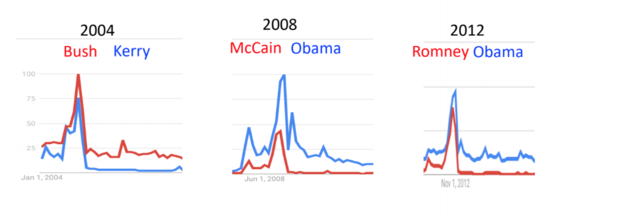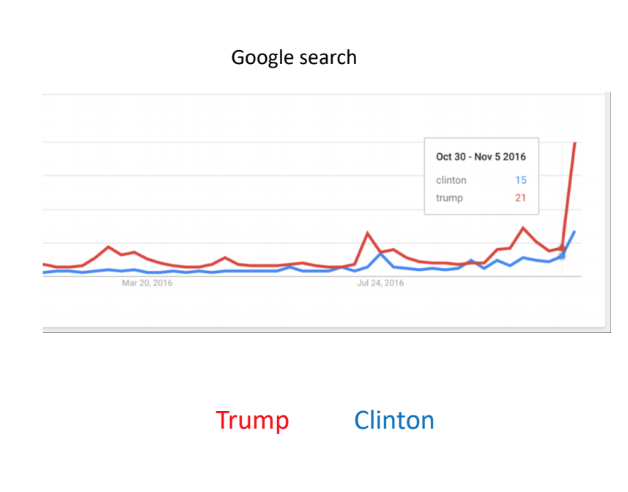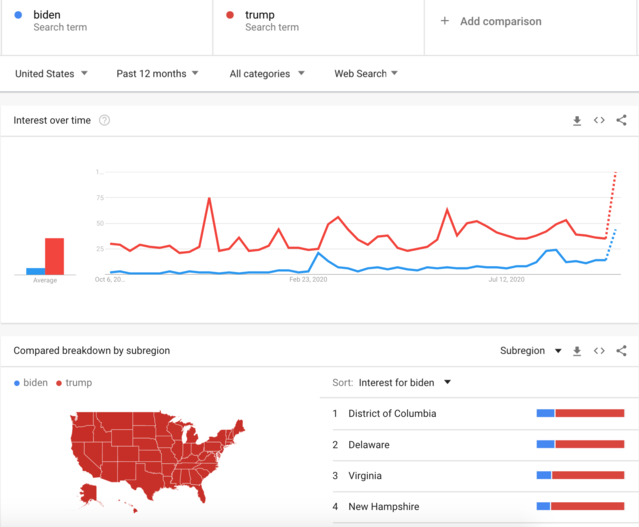Education
Google Search Predicts Big Surprise in November Election
The polls might be way off, again.
Posted October 5, 2020 Reviewed by Lybi Ma
A New York Times post-mortem on polling errors in the 2016 presidential election suggested that polls were off 4 to 10 percent in Clinton's favor for several reasons, among them under-sampling of people who would eventually vote and over-sampling of college-educated voters.
Presumably, since 2016, pollsters have adjusted their "screening" techniques (including or excluding respondents based upon education, probability of voting, and other key factors). Current polls that show Biden with a lead, especially in all-important battleground states such as Pennsylvania, are more accurate this go-round. Therefore, Biden will win both the popular and electoral vote.
Or, maybe not.
Consider the charts below that show Google search interest (relative volume of Google queries for keywords) in 2004-2012 elections.

And again in 2016

An analysis of 32 primaries in previous elections, showed that 27 of these primaries, or 84 percent, were accurately predicted by Google search interest. And for what it's worth, I won a bet with a friend this year about who would win the Texas Democratic primary based on a last-minute surge of search interest in Biden (over Sanders).
What does Google search interest predict about the upcoming presidential election?
Take a look.

Observe that Trump has generated by far the most search interest both nationally, and in each and every state.
One could argue that Trump is an anomaly, because, as a controversial character, he generates lots of extra interest apart from people's voting preferences. But in March of this year, search interest in the two candidates was roughly equivalent, suggesting that Biden is capable of generating search interest comparable to Trump.
And of course, in 2016, search interest in Trump actually did accurately predict the election result.
Depressing if you're a Democrat and encouraging if you're a Republican, but, clearly, for this election, Google search data may not have the same predictive power as in previous elections.
For instance, although Trump has a wide lead over Biden in Google searches in California, New York, and Massachusetts, it's inconceivable that Trump will actually carry these bluer-than-blue states. And of course, the Pandemic is bound to skew results one way or another this year in both search interest and voter turnout.
Still.
One factor that will determine who wins in 2020 is the level of voter turnout in Democrat-leaning cities in swing states such as Detroit, Michigan. Shortly before the 2016 election, UCLA researchers found that Google searches such as "where to vote" in Detroit and other large cities in swing states were down in 2016 over 2012. This suggests, correctly, that fewer inner-city minorities would vote in 2016, tilting the odds in Trump's favor.
Comparing search interest in 2016 and 2020 for the term "where to vote" in Detroit, at the same number of days before the election (29 days), there was over twice the search interest in "where to vote" in 2016 over 2020.
Maybe this lack of interest in "where to vote" reflects Detroit's intent to vote by mail.
Or not.
Despite the power of large numbers embodied in Google search results, the only really safe prediction at this point is: accurate prediction will be as difficult as everything else this year.


